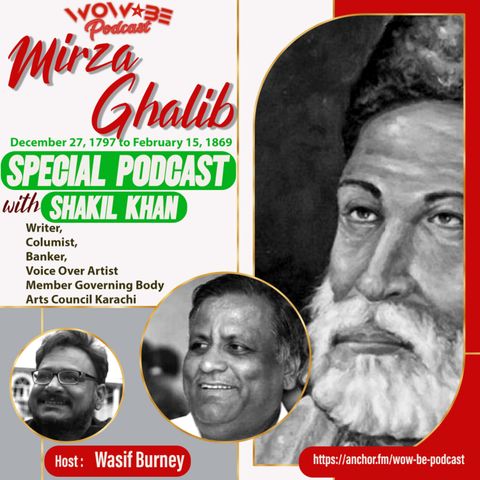Special Podcast on Mirza Ghalib with Shakil Khan

Download and listen anywhere
Download your favorite episodes and enjoy them, wherever you are! Sign up or log in now to access offline listening.
Dec 27, 2020 ·
32m 3s
Guest Shakil Khan, Prominent Banker, writer, columnist and Voice Over artist. Sharing his views on Great Poet Mirza Ghalib. Hosted by Wasif Burney, Produced by Wow Be creatives For Wow...
show more
Guest Shakil Khan, Prominent Banker, writer, columnist and Voice Over artist. Sharing his views on Great Poet Mirza Ghalib.
Hosted by Wasif Burney, Produced by Wow Be creatives For Wow Be Podcast.
Mirza Ghalib was born in Kala Mahal, Agra into a family of Mughals who moved to Samarkand (in modern-day Uzbekistan) after the downfall of the Seljuk kings. His paternal grandfather, Mirza Qoqan Baig, was a Seljuq Turk who had immigrated to India from Samarkand during the reign of Ahmad Shah (1748–54).[6] He worked in Lahore, Delhi and Jaipur, was awarded the sub-district of Pahasu (Bulandshahr, UP) and finally settled in Agra, UP, India. He had four sons and three daughters. Mirza Abdullah Baig and Mirza Nasrullah Baig were two of his sons.
Mirza Abdullah Baig (Ghalib's father) married Izzat-ut-Nisa Begum, an ethnic Kashmiri, and then lived at the house of his father-in-law. He was employed first by the Nawab of Lucknow and then the Nizam of Hyderabad, Deccan. He died in a battle in 1803 in Alwar and was buried at Rajgarh (Alwar, Rajasthan).[8] Back then, Ghalib was a little over 5 years of age. He was then raised by his Uncle Mirza Nasrullah Baig Khan, but in 1806, Nasrullah fell off an elephant and died from related injuries.
At the age of thirteen, Ghalib married Umrao Begum, daughter of Nawab Ilahi Bakhsh (brother of the Nawab of Ferozepur Jhirka). He soon moved to Delhi, along with his younger brother, Mirza Yousuf, who had developed schizophrenia at a young age and later died in Delhi during the chaos of 1857. None of his seven children survived beyond infancy. After his marriage, he settled in Delhi. In one of his letters he describes his marriage as the second imprisonment after the initial confinement that was life itself. The idea that life is one continuous painful struggle which can end only when life itself ends, is a recurring theme in his poetry. One of his couplets puts it in a nutshell
---
This episode is sponsored by
· Anchor: The easiest way to make a podcast. https://anchor.fm/app
---
Send in a voice message: https://anchor.fm/wow-be-podcast/message
show less
Hosted by Wasif Burney, Produced by Wow Be creatives For Wow Be Podcast.
Mirza Ghalib was born in Kala Mahal, Agra into a family of Mughals who moved to Samarkand (in modern-day Uzbekistan) after the downfall of the Seljuk kings. His paternal grandfather, Mirza Qoqan Baig, was a Seljuq Turk who had immigrated to India from Samarkand during the reign of Ahmad Shah (1748–54).[6] He worked in Lahore, Delhi and Jaipur, was awarded the sub-district of Pahasu (Bulandshahr, UP) and finally settled in Agra, UP, India. He had four sons and three daughters. Mirza Abdullah Baig and Mirza Nasrullah Baig were two of his sons.
Mirza Abdullah Baig (Ghalib's father) married Izzat-ut-Nisa Begum, an ethnic Kashmiri, and then lived at the house of his father-in-law. He was employed first by the Nawab of Lucknow and then the Nizam of Hyderabad, Deccan. He died in a battle in 1803 in Alwar and was buried at Rajgarh (Alwar, Rajasthan).[8] Back then, Ghalib was a little over 5 years of age. He was then raised by his Uncle Mirza Nasrullah Baig Khan, but in 1806, Nasrullah fell off an elephant and died from related injuries.
At the age of thirteen, Ghalib married Umrao Begum, daughter of Nawab Ilahi Bakhsh (brother of the Nawab of Ferozepur Jhirka). He soon moved to Delhi, along with his younger brother, Mirza Yousuf, who had developed schizophrenia at a young age and later died in Delhi during the chaos of 1857. None of his seven children survived beyond infancy. After his marriage, he settled in Delhi. In one of his letters he describes his marriage as the second imprisonment after the initial confinement that was life itself. The idea that life is one continuous painful struggle which can end only when life itself ends, is a recurring theme in his poetry. One of his couplets puts it in a nutshell
---
This episode is sponsored by
· Anchor: The easiest way to make a podcast. https://anchor.fm/app
---
Send in a voice message: https://anchor.fm/wow-be-podcast/message
Information
| Author | Wasif Burney |
| Website | - |
| Tags |
-
|
Copyright 2024 - Spreaker Inc. an iHeartMedia Company
